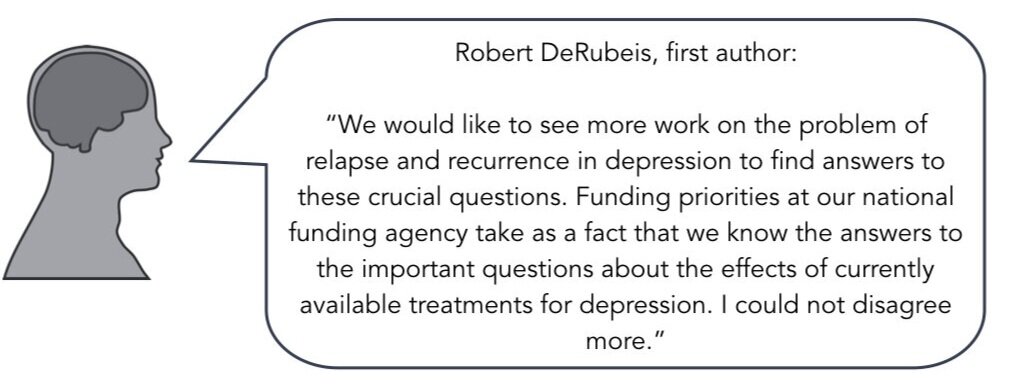Ongoing Antidepressant Medication Treatment Prevents Recurrence of Major Depression
Post by Lincoln Tracy
What's the science?
Evidence suggests that antidepressant medications and cognitive behavioral therapy (CBT) are equally effective in the acute treatment of major depressive disorder (MDD). Furthermore, the combination of these two treatment approaches has been proven to be more effective than either treatment alone in the short term. The ongoing use of antidepressant medication has also been proven to be effective in preventing future depressive episodes. However, it is not known whether CBT has the same long-term preventative effects. This week in JAMA Psychiatry, DeRubeis and colleagues investigated the effects of combining CBT and antidepressant medications when they were continued or withdrawn on preventing recurrent episodes of depression in patients with MDD.
How did they do it?
In phase one of the study, the authors recruited 452 patients (266 women, mean age of 43.2 years) with MDD from three outpatient clinics across the United States. The patients were randomly allocated to one of two treatment groups: antidepressant medication monotherapy or a combination therapy of antidepressant medication and CBT. Patients received treatment for up to three and a half years until recovery from MDD was achieved. The patients who achieved recovery in phase one continued into phase two of the study. In phase two, the authors randomly allocated the 292 patients who recovered from MDD (171 women, mean age of 45.1 years) into one of two groups: one group continued to take antidepressant medication while the second group stopped taking antidepressant medication. Patients who received combination therapy were discontinued from CBT for phase two. This allowed the authors to look at four different groups of patients across the two study phases: (1) patients who received only medication in both phase one and two, (2) patients who received only medication in phase one and received no treatment in phase two, (3) patients who received combination therapy in phase one and medication only in phase two, and (4) patients who received combination therapy in phase one and were discontinued from both treatments for phase two. Patients underwent regular assessments for three years, or until a recurrence of depression occurred.
What did they find?
In phase one, the combined treatment of antidepressant medication and CBT was associated with higher rates of recovery from MDD compared to the medication alone. In phase two, the authors first found that ongoing antidepressant medication therapy was associated with a decreased risk of recurrent depression. A greater proportion of patients who stopped taking antidepressant medication in phase two experienced a recurrent episode of depression regardless of whether they received monotherapy or combination therapy in phase one. That is, the proportion of patients who experienced a recurrent episode of depression was similar for both phase one treatment groups. Second, they found that the likelihood of sustained recovery (i.e. achieving recovery in phase one and then not having a recurrent episode in phase two) was higher for those who remained on medications in phase two, but was not affected by one treatment condition. In other words, receiving CBT in phase one did not appear to affect the odds of sustained recovery.
What's the impact?
The findings of this study show that continued antidepressant treatment in patients with MDD is associated with lower rates of recurrent depression and increased odds of a sustained recovery. These findings highlight the benefits of ongoing antidepressant treatment in this population. Further research is required to determine whether CBT has a similar protective effect, or whether combining antidepressant therapy with CBT interferes with any potential benefits.
DeRubeis et al. Prevention of Recurrence After Recovery From a Major Depressive Episode With Antidepressant Medication Alone or in Combination With Cognitive Behavioral Therapy: A Phase 2 Randomized Clinical Trial. JAMA Psychiatry (2019). Access the original scientific publication here.


